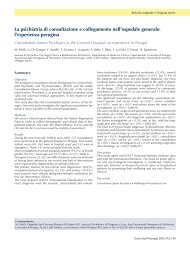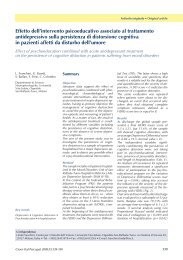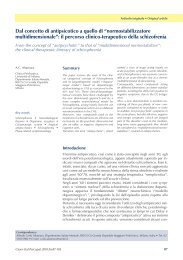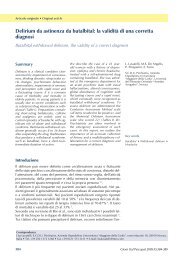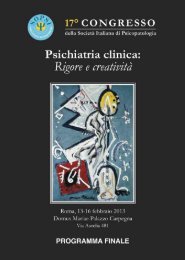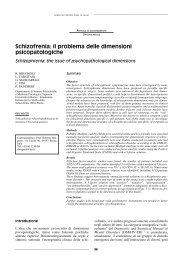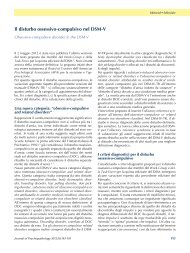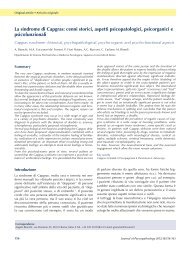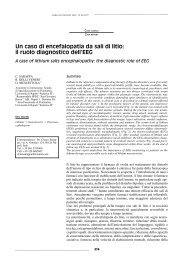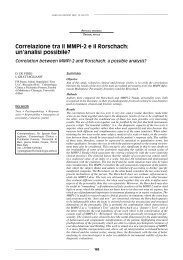- Page 1 and 2: XI CONGRESSO NAZIONALE DELLA SOCIET
- Page 3: GIORNALE ITALIANO DI PSICOPATOLOGIA
- Page 6 and 7: gdhzsh
- Page 8 and 9: ghrehergh
- Page 10 and 11: MERCOLEDÌ 22 FEBBRAIO 2006 - ORE 9
- Page 14 and 15: SESSIONI PLENARIE SABATO 25 FEBBRAI
- Page 16 and 17: fghjfj
- Page 18 and 19: fgaghdh
- Page 20 and 21: Rinunciare alla propria libertà: i
- Page 22 and 23: SIMPOSI TEMATICI Strategie di predi
- Page 24 and 25: co forense, per le carenze legislat
- Page 26 and 27: SIMPOSI TEMATICI Risultati analoghi
- Page 28 and 29: SIMPOSI TEMATICI 22 FEBBRAIO 2005 -
- Page 30 and 31: SIMPOSI TEMATICI L’informazione p
- Page 32 and 33: SIMPOSI TEMATICI Il Disturbo d’An
- Page 34 and 35: SIMPOSI TEMATICI Metodo: sono stati
- Page 36 and 37: SIMPOSI TEMATICI L’impatto del me
- Page 38 and 39: SIMPOSI TEMATICI Alcune ricerche em
- Page 40 and 41: SIMPOSI TEMATICI 22 FEBBRAIO 2005 -
- Page 42 and 43: Introduction SIMPOSI TEMATICI 22 FE
- Page 44 and 45: SIMPOSI TEMATICI Risultati: oltre a
- Page 46 and 47: SIMPOSI TEMATICI gonabile al litio
- Page 48 and 49: SIMPOSI TEMATICI Conclusioni: allo
- Page 50 and 51: evidenziato che a fronte di un sign
- Page 52 and 53: SIMPOSI TEMATICI tra gravità dell
- Page 54 and 55: SIMPOSI TEMATICI Questionario dei s
- Page 56 and 57: le aree di competenza siano distint
- Page 58 and 59: SIMPOSI TEMATICI Conclusions: neuro
- Page 60 and 61: SIMPOSI TEMATICI 22 FEBBRAIO 2005 -
- Page 62 and 63:
SIMPOSI TEMATICI 22 FEBBRAIO 2005 -
- Page 64 and 65:
SIMPOSI TEMATICI socio assistenzial
- Page 66 and 67:
SIMPOSI TEMATICI fici e la prolifer
- Page 68 and 69:
SIMPOSI TEMATICI riprodursi/perdura
- Page 70 and 71:
SIMPOSI TEMATICI Psicopatologia e p
- Page 72 and 73:
SIMPOSI TEMATICI È la dopamina imp
- Page 74 and 75:
SIMPOSI TEMATICI Si tratta di favor
- Page 76 and 77:
SIMPOSI TEMATICI problematiche dell
- Page 78 and 79:
Le Depressioni Bipolari secondo la
- Page 80 and 81:
23 FEBBRAIO 2005 - ORE 14.15-15.45
- Page 82 and 83:
Uso di cannabis e dimensioni clinic
- Page 84 and 85:
SIMPOSI TEMATICI li e le finalità
- Page 86 and 87:
SIMPOSI TEMATICI Nella clinica, la
- Page 88 and 89:
SIMPOSI TEMATICI in età adulta; è
- Page 90 and 91:
SIMPOSI TEMATICI possibili risposte
- Page 92 and 93:
SIMPOSI TEMATICI La prevalenza e l
- Page 94 and 95:
SIMPOSI TEMATICI 2 Altamura AC, Bas
- Page 96 and 97:
nell’affrontare questo tema, part
- Page 98 and 99:
SIMPOSI TEMATICI La possibilità di
- Page 100 and 101:
SIMPOSI TEMATICI realtà e le sue r
- Page 102 and 103:
SIMPOSI TEMATICI s’avverte fluire
- Page 104 and 105:
Sadismo e Disturbo di Personalità
- Page 106 and 107:
Creazioni oniriche R. Rossi Diparti
- Page 108 and 109:
SIMPOSI TEMATICI 23 FEBBRAIO 2005 -
- Page 110 and 111:
SIMPOSI TEMATICI scun gene ANIA è
- Page 112 and 113:
SIMPOSI TEMATICI Nel nostro laborat
- Page 114 and 115:
SIMPOSI TEMATICI caratteristicament
- Page 116 and 117:
SIMPOSI TEMATICI 23 FEBBRAIO 2005 -
- Page 118 and 119:
SIMPOSI TEMATICI Pur risultando, in
- Page 120 and 121:
SIMPOSI TEMATICI noscenza sulle att
- Page 122 and 123:
SIMPOSI TEMATICI le differenti tipo
- Page 124 and 125:
sivi; una proiezione infantile di p
- Page 126 and 127:
SIMPOSI TEMATICI 23 FEBBRAIO 2005 -
- Page 128 and 129:
SIMPOSI TEMATICI Parafilie emergent
- Page 130 and 131:
Il consenso nella psicoterapia G.C.
- Page 132 and 133:
SIMPOSI TEMATICI clinica dei farmac
- Page 134 and 135:
SIMPOSI TEMATICI rendeva conto dell
- Page 136 and 137:
SIMPOSI TEMATICI 24 FEBBRAIO 2005 -
- Page 138 and 139:
L’identità borderline SIMPOSI TE
- Page 140 and 141:
SIMPOSI TEMATICI missione dei sinto
- Page 142 and 143:
SIMPOSI TEMATICI 24 FEBBRAIO 2005 -
- Page 144 and 145:
SIMPOSI TEMATICI 24 FEBBRAIO 2005 -
- Page 146 and 147:
SIMPOSI TEMATICI comportamento nell
- Page 148 and 149:
SIMPOSI TEMATICI La terza si riferi
- Page 150 and 151:
SIMPOSI TEMATICI significativamente
- Page 152 and 153:
SIMPOSI TEMATICI Methods: subjects
- Page 154 and 155:
SIMPOSI TEMATICI tosa ma soprattutt
- Page 156 and 157:
SIMPOSI TEMATICI 24 FEBBRAIO 2005 -
- Page 158 and 159:
SIMPOSI TEMATICI Disturbi dell’Um
- Page 160 and 161:
SIMPOSI TEMATICI da restrizione del
- Page 162 and 163:
SIMPOSI TEMATICI month trial of lam
- Page 164 and 165:
SIMPOSI TEMATICI Le depressioni sec
- Page 166 and 167:
SIMPOSI TEMATICI nervosa. J Nerv Me
- Page 168 and 169:
SIMPOSI TEMATICI Il trattamento del
- Page 170 and 171:
SIMPOSI TEMATICI liare e diventa es
- Page 172 and 173:
SIMPOSI TEMATICI 24 FEBBRAIO 2005 -
- Page 174 and 175:
SIMPOSI TEMATICI Per la valutazione
- Page 176 and 177:
SIMPOSI TEMATICI 24 FEBBRAIO 2005 -
- Page 178 and 179:
SIMPOSI TEMATICI applicazioni hanno
- Page 180 and 181:
SIMPOSI TEMATICI La valutazione neu
- Page 182 and 183:
SIMPOSI TEMATICI 25 FEBBRAIO 2005 -
- Page 184 and 185:
SIMPOSI TEMATICI 25 FEBBRAIO 2005 -
- Page 186 and 187:
SIMPOSI TEMATICI namento familiare.
- Page 188 and 189:
SIMPOSI TEMATICI antipsicotico tipi
- Page 190 and 191:
SIMPOSI TEMATICI A questo serve dun
- Page 192 and 193:
Aspetti etici e giuridici del conce
- Page 194 and 195:
Trauma e isteria SIMPOSI TEMATICI 2
- Page 196 and 197:
SIMPOSI TEMATICI casi ad un disturb
- Page 198 and 199:
SIMPOSI TEMATICI to ad attribuire a
- Page 200 and 201:
SIMPOSI TEMATICI Questo conflitto c
- Page 202 and 203:
Reference 1 Isacsson G. Suicide pre
- Page 204 and 205:
SIMPOSI TEMATICI Metodologia: una d
- Page 206 and 207:
SIMPOSI TEMATICI in patients attend
- Page 208 and 209:
SIMPOSI TEMATICI eccezionale, in qu
- Page 210 and 211:
SIMPOSI TEMATICI 25 FEBBRAIO 2005 -
- Page 212 and 213:
SIMPOSI TEMATICI 25 FEBBRAIO 2005 -
- Page 214 and 215:
SIMPOSI TEMATICI da diffuso pessimi
- Page 216 and 217:
SIMPOSI TEMATICI terapeutica, è da
- Page 218 and 219:
SIMPOSI TEMATICI 25 FEBBRAIO 2005 -
- Page 220 and 221:
SIMPOSI TEMATICI rità di apprendim
- Page 222 and 223:
SIMPOSI TEMATICI ecc.) la popolazio
- Page 224 and 225:
BRAINSTORMING IN NEUROPSICHIATRIA e
- Page 226 and 227:
BRAINSTORMING IN NEUROPSICHIATRIA i
- Page 228 and 229:
fhdhdsh
- Page 230 and 231:
POSTER 3. Quetiapina ed altri stabi
- Page 232 and 233:
Conclusioni: un’attenta valutazio
- Page 234 and 235:
maco psicotropo, e 10 pazienti affe
- Page 236 and 237:
Tab. I. ta: AN 33,4%, BN 23,2%, BED
- Page 238 and 239:
tre si è avuto un aumento dell’i
- Page 240 and 241:
POSTER donne) con un’età media d
- Page 242 and 243:
Conclusioni: il Burn out si svilupp
- Page 244 and 245:
Metodologia: studio caso-controllo.
- Page 246 and 247:
45. Utilizzo della mirtazapina in p
- Page 248 and 249:
2001 e febbraio 2005, considerando
- Page 250 and 251:
POSTER Metodi: sono stati inclusi n
- Page 252 and 253:
POSTER 60. Considerazioni sull’os
- Page 254 and 255:
POSTER The Assessments (Baseline; T
- Page 256 and 257:
POSTER I dati sono stati elaborati
- Page 258 and 259:
74. Depressione e sintomi fisici PO
- Page 260 and 261:
80. L’incidentarsi: studio di var
- Page 262 and 263:
Risultati: sono risultati positivi
- Page 264 and 265:
Obiettivo: valutare l’effectivene
- Page 266 and 267:
partecipanti allo studio avevano in
- Page 268 and 269:
POSTER sia ad un peggioramento dell
- Page 270 and 271:
POSTER alcune sostanze d’abuso so
- Page 272 and 273:
Metodologia: sono stati valutati 30
- Page 274 and 275:
L’inserimento all’attività di
- Page 276 and 277:
113. Stili d’attaccamento insicur
- Page 278 and 279:
POSTER tuzionali” quali le forze
- Page 280 and 281:
Tohen M, Stoll AL, Strakowski SM, F
- Page 282 and 283:
ma Scale (DTS). Le diagnosi rilevat
- Page 284 and 285:
La dimensione del campione richiede
- Page 286 and 287:
Bibliografia Hallstrom T, Noppa H.
- Page 288 and 289:
140. Dottor Freud, dov’è finita
- Page 290 and 291:
145. Possibile effetto additivo di
- Page 292 and 293:
drop out e il tempo di inizio di ri
- Page 294 and 295:
pendenti, omogenei (per età, sesso
- Page 296 and 297:
POSTER was necessary in order to te
- Page 298 and 299:
POSTER Grunfeld E, Whelan TJ, Zitze
- Page 300 and 301:
POSTER l’impiego in combinazione
- Page 302 and 303:
e-uptake della serotonina (SSRI), o
- Page 304 and 305:
Fig. 1. Fig. 2. tanza della psichia
- Page 306 and 307:
L’analisi ha inoltre evidenziato
- Page 308 and 309:
POSTER to di materiale verbale, Tes
- Page 310 and 311:
lar disorder, and particularly in t
- Page 312 and 313:
POSTER il funzionamento cognitivo e
- Page 314 and 315:
controlli nella prova di ToM e nell
- Page 316 and 317:
205. Interventi di Psichiatria di L
- Page 318 and 319:
Risultati: tra il T0 e il T1, sono
- Page 320 and 321:
do di devianza del consumo (sostanz
- Page 322 and 323:
no una fotofilia significativamente
- Page 324 and 325:
POSTER cosio. Essi dal punto di vis
- Page 326 and 327:
isultati sono particolarmente inter
- Page 328 and 329:
POSTER ment of patients with border
- Page 330 and 331:
240. Border e Bipolari: un confront
- Page 332 and 333:
245. Valutazione di un programma te
- Page 334 and 335:
249. Il trattamento farmacologico d
- Page 336 and 337:
POSTER obesi (BMI > 30). L’inquad
- Page 338 and 339:
pione originale di Novak e del camp
- Page 340 and 341:
262. La depressione in un campione
- Page 342 and 343:
POSTER 266. Associazione tra gravit
- Page 344 and 345:
non differivano dai soggetti Tg neg
- Page 346 and 347:
POSTER Metodologia: studio prospett
- Page 348 and 349:
279. Correlati neurali del riconosc
- Page 350 and 351:
284. Risposta soggettiva al trattam
- Page 352 and 353:
289. La terapia combinata del Distu
- Page 354 and 355:
POSTER ma B (afferenti alla Struttu
- Page 356 and 357:
POSTER mesi di luglio ed agosto 200
- Page 358 and 359:
Risultati e conclusoni: il disturbo
- Page 360 and 361:
Bibliografia Cnattingius S, Hultman
- Page 362 and 363:
POSTER (Roy-Byrne et al., 1997; Bar
- Page 364 and 365:
Metodologia: 65 nullipare con decor
- Page 366 and 367:
MA, HAMD, PAAAS, SCRAS, MSPS, SF36
- Page 368 and 369:
le dimensioni psicopatologiche rima
- Page 370 and 371:
POSTER Metodi: il campione è costi
- Page 372 and 373:
POSTER I dati raccolti sono stati s
- Page 374 and 375:
termine. È quindi importante garan
- Page 376 and 377:
Metodologia: la revisione dei resoc
- Page 378 and 379:
dei familiari, cultura, tempo liber
- Page 380 and 381:
351. Screening per i disturbi bipol
- Page 382 and 383:
POSTER Campbell JC. Domestic homici
- Page 384 and 385:
nuto opportuno valutare le caratter
- Page 386 and 387:
spesso per l’elemento temporale,
- Page 388 and 389:
sk factors and symptom measures. Ea
- Page 390 and 391:
struttura inviante, luogo di proven
- Page 392 and 393:
POSTER 384. Differenze ed analogie
- Page 394 and 395:
za cardiaca (VFC) 2 che predispone
- Page 396 and 397:
Risultati e conclusioni: tutti i pa
- Page 398 and 399:
corso di morbo di parkinson, anche
- Page 400 and 401:
403. Iperprolattinemia, disturbi d
- Page 402 and 403:
DOC, anche se i pattern di eredità
- Page 404 and 405:
livello elettrocardiografico. In le
- Page 406 and 407:
421. Terapia di gruppo in soggetti
- Page 408 and 409:
427. Trattamento ambulatoriale del
- Page 410 and 411:
432. Avvenimenti della vita e perso
- Page 412 and 413:
d’uso anche per le pazienti con d
- Page 414 and 415:
sualità in un campione di pazienti
- Page 416 and 417:
Bona L., 245, 303, 337, 406 Bonanno
- Page 418 and 419:
Di Giuseppe B., 378 Di Giusto M., 2
- Page 420 and 421:
Lovadina A., 291, 292 Loviselli A.,
- Page 422 and 423:
Peccarisi C., 191 Pedrini E., 330 P
- Page 424:
Tartaglia R., 282 Tartaglione S., 7



